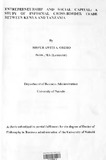| dc.description.abstract | This thesis concerns cross-border trade and regional integration, focusing on the
informal cross-border trade between Kenya and Tanzania at Isebania/Sirare border.
The cross-border trade is characterized by the duality of the routes taken by the
traders while crossing the border with goods, a feature frequently referred to as formal
and informal trade. The immediate objective of this thesis is to produce a better
understanding of these phenomena, argued to be highly relevant to the region's wider
economic development.
To understand cross-border trade at Isebania/Sirare border, a new concept frame is put
forward based on capital theory drawing on both economic and social theories. This
frame sees the potential for the cross-border trade in terms of the economic and the
social context. The notion of funding is introduced to describe the economic resources
that are individually owned and the social resources that accrue to the traders from the
interaction among themselves and also with the other actors within this trading
environment. It is argued on one hand that the resources that are used by the traders
who cross the border formally are individually owned in the form of physical and
human capital. On the other hand, while the informal cross-border traders have less of
such economic resources, they access in addition, the social resources accruing from
their accumulation and use of social capital.
Social capital as a concept is derived from both classical economic and social theory.
According to Fine (200 I:15) "its very name is highly significant, with capital taken as
the economic ... and social as, by implication the non-eco-nomic." The use of social capital as a conceptual tool therefore seeks to integrate economic with non-economic
analysis or at least for the two to complement one another. But social capital can be
used in contexts without what might be construed as directly economic content.
Possession of social capital, for example, is deemed to enable individuals to
accomplish higher achievements in many walks of life, such as being healthy.
Within the broad orthodox of the economic paradigm, entrepreneurship is regarded as
the fourth factor of production after land, labour and capital. Entrepreneurship is here
conceived as the essential catalyst which combines the three factors into productive
form, and also essential in completing the production and exchange circuit discussed
in chapter 4, through the exchange process. Knight (1921) and other neo-classicalists
such as Marshall and Shultz conceived of the entrepreneur as responsible for making
decisions under conditions of uncertainty.
In the methodology, a triangulation of evidence from case studies of the informal
cross-border traders on both the Kenyan and Tanzania side of the border, together
with evidence from the survey study of both the formal and informal cross-border
traders was used to answer the following questions:
• What variables, if any explain the traders' choice of the informal routes?
• Are there reasons why traders do not use the formal trading routes?
• Is the crossing environment at the formal route inimical to traders with limited
amount of certain types of capital, causing them to avoid such routes?
The findings suggest that there are strong indications of differences in funding
between the formal and the informal cross-border traders. Traders who take the
formal routes are observed to rely strongly on the resources they own in the form of
physical and human capital. Such an option does not appear open to the informal
cross-border traders who own less of such economic resources and have to
supplement such deficiency with social capital accumulated through interaction
among themselves and other actors. The success of the regional integration initiatives
will necessitate taking into account such funding from the informal cross-border
traders. Simple opening of the formal border crossing points and market liberalisation
will not suffice because of the disconnect between the policies stipulated in the
regional integration agreements and the actual practice of trade within the border
region. | en |

